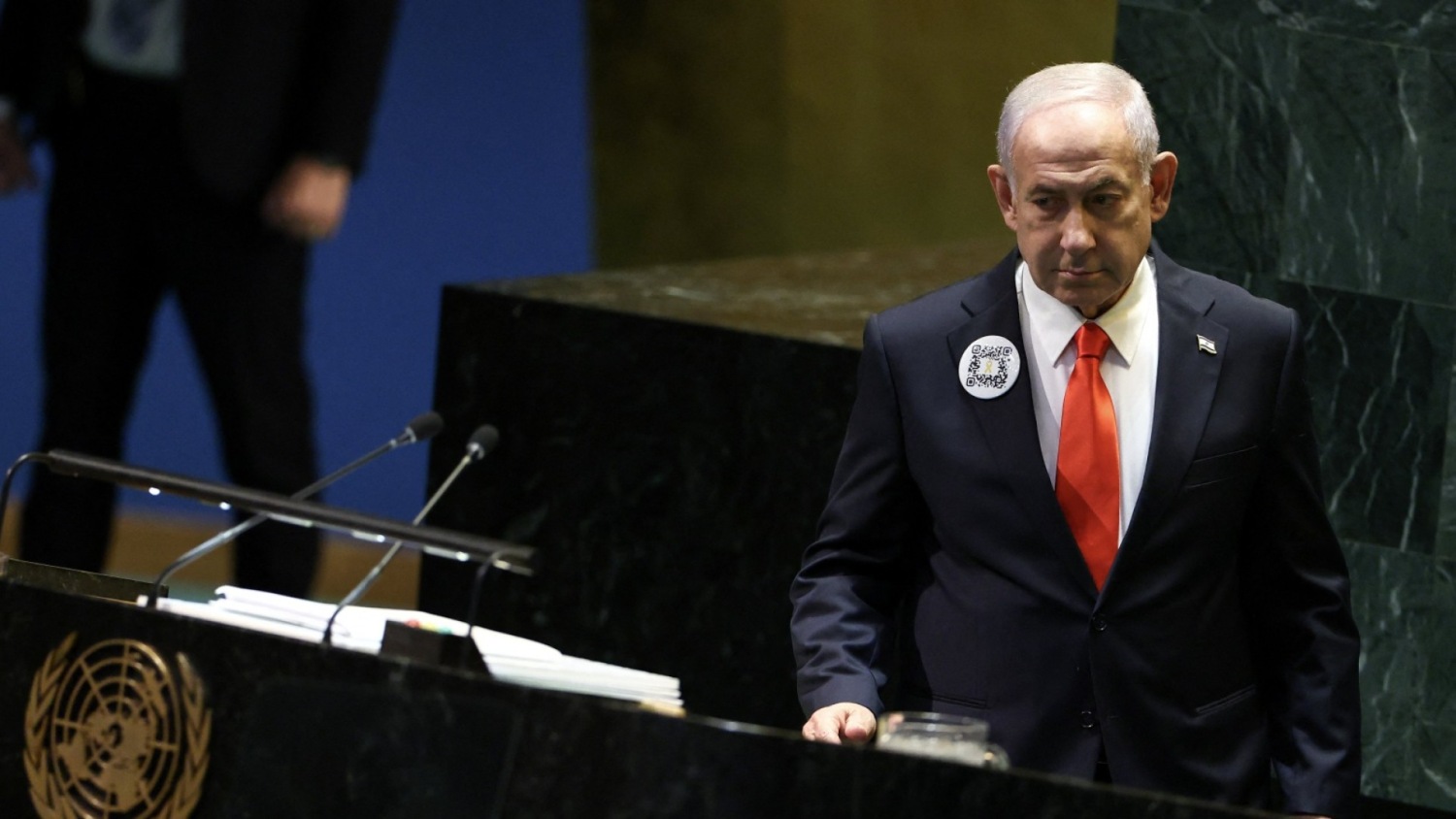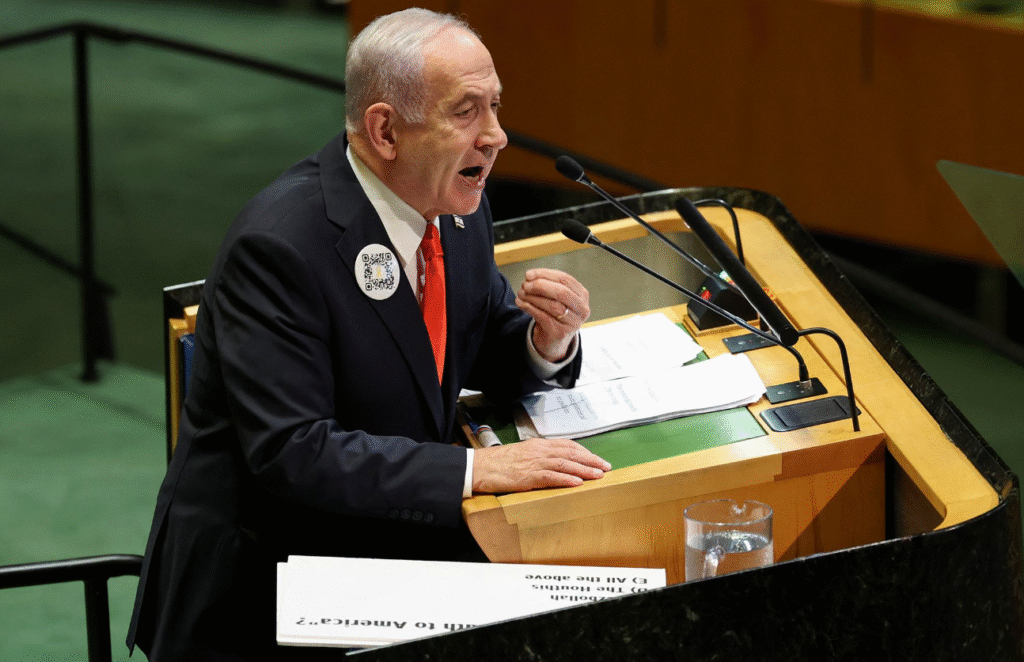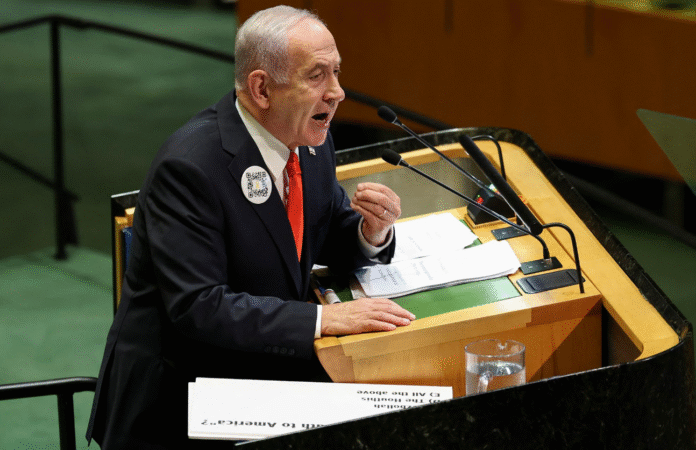Netanyahu Attacks Palestinian Recognition During UN Speech
In one of the most controversial addresses Netanyahu Attacks Palestinian Recognition at the United Nations General Assembly. Israeli Prime Minister Benjamin Netanyahu launched a scathing criticism of recent international recognition of Palestinian statehood. Netanyahu Attacks Palestinian Recognition. His remarks sparked a dramatic response, as dozens of diplomats and officials walked out, leaving much of the hall visibly empty.
During the combative speech, Netanyahu attacked Palestinian recognition moves by Western powers, calling them a “mark of shame”. According to him, acknowledging a Palestinian state sends the dangerous message that “murdering Jews pays off.”
His words drew outrage not just inside the UN chamber but also on the streets outside, where protesters rallied against Israel’s ongoing war in Gaza.

The Growing Wave of Palestinian Recognition
Netanyahu’s remarks came just days after a diplomatic wave saw countries including the United Kingdom, France, Canada, and Australia recognize Palestinian statehood. These decisions, applauded by Palestinians and their allies, represent mounting global frustration with Israel’s policies in Gaza and the West Bank.
However, Netanyahu attacked Palestinian recognition as an existential threat to Israel, vowing that his government would never allow a Palestinian state to exist. He insisted that most Israelis back this position, despite international pressure for a two-state solution.
This rejection highlights the deep divide between Israel and many of its closest allies, with critics warning that Netanyahu’s stance risks isolating the country further on the global stage.
Netanyahu’s Fiery Rhetoric at the UN
At the start of his speech, Netanyahu held up a map titled “The Curse”, which he claimed illustrated the spread of Iranian-backed proxy groups across the Middle East. He cited Israeli military actions against Hezbollah in Lebanon, the Houthis in Yemen, Hamas in Gaza, and Iran itself as evidence of Israel’s ongoing fight against what he called “terror networks.”
The Israeli leader even thanked former U.S. President Donald Trump for assisting in the June bombing of Iran’s Fordo nuclear facility, drawing a parallel between Hamas’s October 7, 2023 attack on Israel and the 9/11 attacks in the United States.
“We are fighting the same enemies,” Netanyahu said, pointing to chants of “death to America” among groups tied to Iran.
UN Accusations Rejected
Netanyahu went on to dismiss findings from a United Nations commission of inquiry that accused Israel of committing genocide in Gaza. He labeled the claims “baseless.”
He also rejected reports from multiple UN agencies that Israel has deliberately restricted humanitarian aid into Gaza. Despite widespread warnings of famine from international bodies, Netanyahu insisted that aid restrictions are exaggerated and politically motivated.
This defiance has fueled criticism from rights organizations such as Amnesty International, which continue to call for accountability in Gaza.
The Loudspeaker Stunt Across Gaza
In an unusual move, Netanyahu’s office ordered Israeli forces to mount loudspeakers along the Gaza border to broadcast his UN speech directly into the besieged territory. He even claimed Israeli intelligence hacked into smartphones in Gaza to stream his message.
Speaking to Israeli hostages held in Gaza, he declared: “We have not forgotten you, not even for a second. The people of Israel are with you. We will not rest until we bring you home.”
However, residents inside Gaza expressed anger at what they described as a humiliating stunt. One man told the BBC: “What does he gain by forcing his speech on civilians in tents, except more humiliation?”
Currently, 48 Israeli hostages remain in Gaza, with 20 believed to be alive.
Domestic Criticism of Netanyahu’s UN Speech
While Netanyahu attacked Palestinian recognition abroad, his speech received mixed reviews at home. Opposition figures accused him of theatrics rather than leadership.
Yair Lapid, leader of the opposition, said: “Today saw a weary and whining Israeli prime minister, in a speech overloaded with gimmicks.”
Yair Golan, head of the Democrats party, added: “This was propaganda, childish, and insane. Netanyahu showed victimhood and blindness to the suffering of both hostages and soldiers.”
These sharp criticisms underscore growing divisions within Israel over Netanyahu’s leadership during the ongoing war.
Abbas Calls for Peace While Trump Teases Gaza Deal
In stark contrast, Palestinian Authority President Mahmoud Abbas addressed the UN a day earlier, signaling readiness to cooperate with world leaders on a comprehensive peace plan.
Shortly after Netanyahu concluded his speech, Donald Trump told reporters: “I think we have a deal on Gaza.” Though details were scarce, his remark has fueled speculation about a potential ceasefire deal.
Gaza Conflict and Human Toll
The backdrop of Netanyahu’s UN speech is the devastating war in Gaza. Netanyahu Attacks Palestinian Recognition. The conflict began after Hamas’s October 7, 2023 assault on southern Israel, which killed about 1,200 people and saw 251 hostages taken.
Since then, Israel’s military campaign has left catastrophic losses in Gaza. According to the Hamas-run health ministry, at least 65,549 Palestinians have been killed.
Despite these numbers, international journalists remain barred from entering Gaza independently, with Israel restricting media access to military-guided tours. This has made verifying claims on the ground extremely difficult.

Why Netanyahu Attacks Palestinian Recognition
Netanyahu’s aggressive stance reflects Israel’s fear that international recognition of Palestinian statehood could strengthen Palestinian claims at the UN, the International Court of Justice, and other international bodies.
By framing recognition as a “reward for terrorism,” Netanyahu seeks to rally domestic support and delegitimize the growing diplomatic momentum for Palestinians.
However, critics argue that this approach isolates Israel, alienates allies, and fuels further unrest in the region.
Conclusion: A Divided Stage
As Netanyahu attacks Palestinian recognition at the UN, the political fallout continues both at home and abroad. For his supporters, the fiery speech reaffirms Israel’s defiance against global pressure. For his critics, it highlights a leader increasingly out of touch with international opinion and the human cost of war.
Whether Netanyahu’s rhetoric strengthens Israel’s position or accelerates its isolation remains to be seen. What is clear is that the recognition of a Palestinian state by major Western powers marks a turning point in the Israeli-Palestinian conflict, one that even a defiant UN speech cannot undo.

